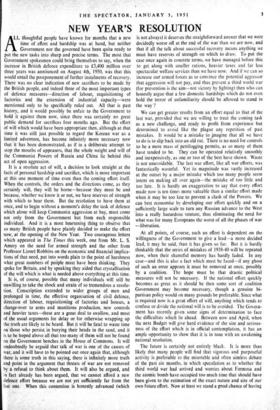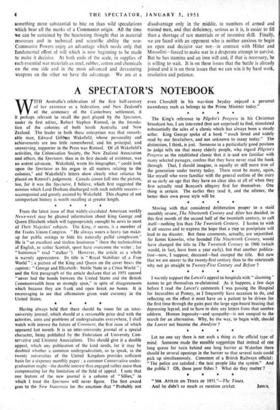NEW YEAR'S RESOLUTION
ALL thoughtful people have known for months that a new time of effort and hardship was at hand, but neither Government nor the governed have been quite ready to put the new tasks into sharp and precise terms. The most that Government spokesmen could bring themselves to say, when the increase in British defence expenditure to £3,400 million over three years was announced on August 4th, 1950, was that this would entail the postponement of further instalments of recovery. There was no clear indication of new sacrifices to be made by the British people, and indeed three of the most important types of defence measures—direction of labour, requisitioning of factories and the extension of industrial capacity—were mentioned only to be specifically ruled out. All that is past history, and it would possibly be unfair to the Government to hold it against them now, since there was certainly no great public demand for sacrifices four months ago. But the effort of will which, would have been appropriate then. although at that time it was still just possible to regard the Korean war as a limited adventure, has become infinitely more necessary now that it has been demonstrated, as if in a deliberate attempt to stop the mouths of appeasers, that the whole weight and will of the Communist Powers of Russia and China lie behind this act of open aggression.
It is a resolute act of will, a decision to look straight at the facts of personal hardship and sacrifice, which is more important at this one moment of time even than the coming effort itself. When the controls, the orders and the directions come, as they certainly will, they will be borne—because they must be and because, whether we know it or not, we have reserves of strength with which to bear them. But the resolution to have them at once, and to begin without a moment's delay the task of defence which alone will keep Communist aggression at bay, must come not only from the Government but from each responsible individual. And it is a most heartening thing to observe that so many British people have plainly decided to make the effort now, at the opening of the New Year. Two courageous letters which appeared in The Times this week, one from Mr. L. S. Amery on the need for armed strength and the other from Professor Lionel Robbins on the economic and financial implica- tions of that need, put into words plain to the point of harshness what great numbers of pedple must have been thinking. They spoke for Britain, and by speaking they aided that crystallisation of the will which is what is needed above everything at this time.
It is, of course, possible that many individuals will still be unwilling to take the shock and strain of so tremendous a resolu- tion. Conscription extended to wider, groups of men and prolonged in time, the effective organisation of civil defence, direction of labour, requisitioning of factories and houses, a change-over to arms and munitions production, new controls and heavier taxes—these are a great deal to swallow, and most of the usual arguments for delay or for otherwise wrapping up the truth are likely to be heard. But it will be fatal to waste time on those who persist. in burying their heads in the sand, and it is to be hoped above all that too many of them will not be found on the Government benches in the House of Commons. It will undoubtedly be argued that talk of war is one of the causes of war, and it will have to be pointed out once again that, although there is some truth in this saying, there is infinitely more truth and point in the argument that threats of war are not removed by a refusal to think about them. It will also be argued, and 'n fact already has been argued, that we cannot afford a new Defence effort because we are not yet sufficiently far from the List one. When this contention is honestly advanced (which is not always) it deserves the straightforward answer that we were decidedly worse off at the end of the war than we are now, and that if all the talk about successful recovery means anything we must have reserves of strength on which to draw. To put the case once again in concrete terms, we have managed before this to get along with smaller rations, heavier taxes and far less spectacular welfare services than we have now. And if we can so increase out armed forces as to convince the potential aggressor that aggression will not pay, and thus prevent a third world war (for prevention is the aim—not victory by fighting) then who can honestly argue that a few domestic hardships which do not even hold the terror of unfamiliarity should be allowed to stand in the way ?
We can get greater results from an effort equal to that of the last war, provided that we are willing to treat the coming task as a new challenge, and ready to profit from experience but determined to avoid like the plague any repetition of past mistakes. It would be a mistake to jmagine that all we have to do is to slip back into an old rut. There is no need for controls to be a mere mass of pettifogging permits, as so many of them have tended to be. They can be operated relatively smoothly and inexpensively, as one or two of the best have shown. Waste is not unavoidable. The last war effort, like all war efforts, was fantastically wasteful. Yet its magnitude was vastly increased at the outset by a major mistake which too many people seem intent on making all over again—the mistake of too little and too late. It is hardly an exaggeration to say that every effort made now is ten times more valuable than a similar effort made when it may be too late to prevent a clash of the Powers. We can best economise by developing our effort quickly and on a sufficiently large scale to turn any Russian advance to the West -into a really hazardous venture, thus eliminating the need for what was for many Europeans the worst of all the phases of war —liberation.
At all points, of course, such an effort is dependent on the willingness of the Government to give a lead—a more decided lead, it may be said, than it has given so far. But it is hardly thinkable that the series of mistakes of 1938-40 will be repeated now, when their shameful memory has hardly faded. In any case—and this is also a fact which must be faced—if any ghost of such an error appears it must be removed at once, possibly by a coalition. The hope must be that drastic political measures will not be necessary. If the national effort quickly becomes as great as it should be then some sort of coalition Government may become necessary, though a genuine bi- partisan policy would on many grounds be preferable. Since what is required now is a great effort of will, anything which tends to confuse or divide the national will is to be avoided. The Govern- ment has recently given some signs of determination to face the difficulties which lie ahead. Between now and April, when the next Budget will give hard evidence of the size and serious- ness of the effort which is in official contemplation, it has an ample opportunity to show that it is in tune with an awakening national resolution.
The future is certainly not entirely black. It is more than likely that many people will find that vigorous and purposeful activity is preferable to the miserable and often aimless debate of the past six months, in which speculation as to whether the third world war had arrived and worries about Formosa and the atomic bomb have occupied too much time that should have been given to the estimation of the exact nature and size of our own future effort. Now at least we stand a good chance of having something more substantial to bite on than wild speculations which bear all the marks of a Communist origin. All the time we can be sustained by the heartening thought that in material resources and in technical and scientific ability the non- Communist Powers enjoy an advantage which needs only that fundamental effort of will which is now beginning to be made to make it decisive. At both ends of the scale, in supplies of such essential war materials as steel, rubber, cotton and chemicals on the one side and in the most advanced and devastating weapons on the other we have the advantage. We are at a disadvantage only in the middle, in numbers of armed and trained men, and that deficiency, serious as it is. is easier to fill than a shortage of raw materials or of inventive skill. Finally, we are faced with an opponent who is neither anxious to begin an open and decisive war nor—in contrast with Hitler and Mussolini—forced to make war in a desperate attempt to survive. But he has stamina and an iron will and, if that is necessary, he is willing to wait. It is on these issues that the battle is already joined and it is on these issues that we can win it by hard work, resolution and patience.







































 Previous page
Previous page